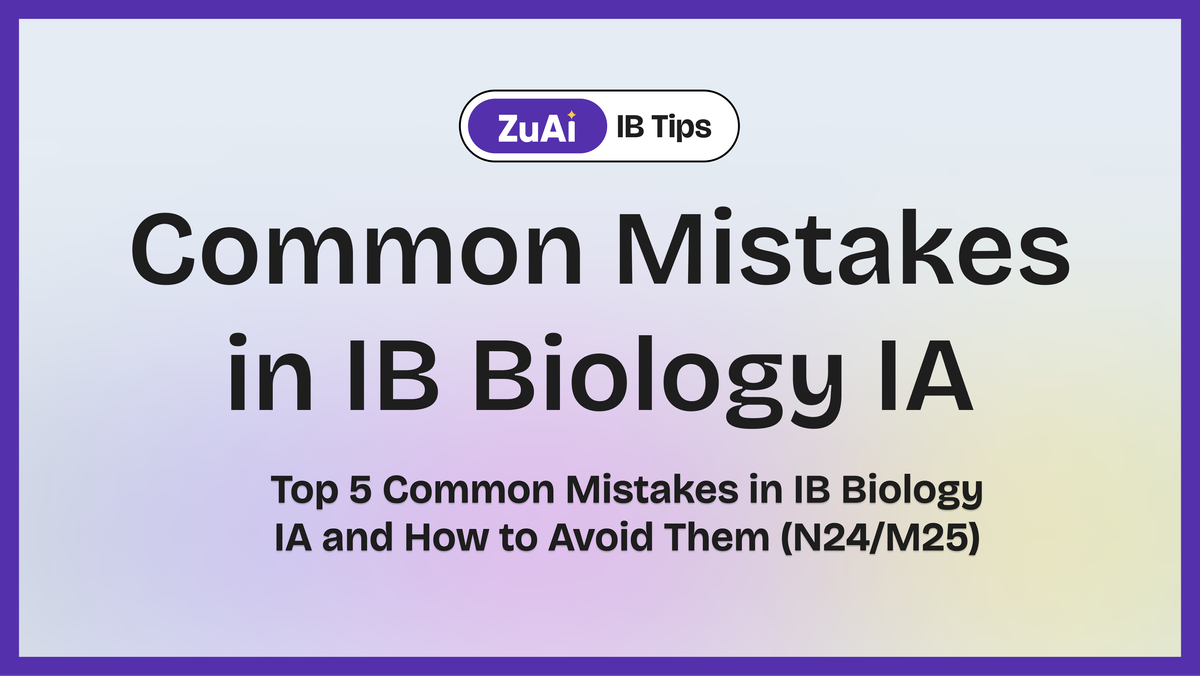Top 5 Common Mistakes in IB Biology IA and How to Avoid Them (N24/M25)

Author: Sarah Thompson, IB Biology Examiner and Teacher
Are you getting ready for your IB Biology IA but feeling overwhelmed? Don’t worry—you’re not alone! As an experienced IB Biology teacher and examiner, I’ve seen many students make the same mistakes, year after year. But you don’t have to fall into those traps!
In this blog, I’ll share the top 5 common mistakes in IB Biology IA and give you tips on how to avoid them, so you can confidently submit your best work for the N24 and M25 exam sessions.
Why Avoiding These Mistakes Matters
Your IB Biology IA is a big part of your final grade, so getting it right is crucial. By steering clear of these common mistakes, you'll increase your chances of scoring highly and making the process smoother and more enjoyable. Let’s dive in!
Mistake 1: Choosing a Topic That’s Too Broad
Why This Happens
One of the most common mistakes students make is picking a topic that’s too broad. A topic like “The Effects of Pollution on Marine Life” might seem exciting, but it’s way too wide to cover in a single IA
How to Avoid It
Pick something focused and specific, like “The Effects of Temperature on Yeast Respiration.” This narrower focus allows you to dive deeper into your research and present clear, meaningful data.
Pro Tip: Check out IB Biology IA examples for inspiration. Seeing how other students narrowed their topics can help you avoid the same mistake.
Mistake 2: Poor Experimental Design
Why This Happens
You have a great topic, but your experiment is poorly designed, leading to unreliable results. Not controlling key variables or not having a clear method will hurt your IA score.
How to Avoid It
Plan ahead and test your method before running the full experiment. For example, if you’re studying “The Effect of Light on Photosynthesis,” make sure to control other factors like CO₂ levels and water temperature.
Remember: A well-designed experiment is a must for a successful IA. This is where attention to detail counts!
Mistake 3: Inadequate Data Collection
Why This Happens
A common pitfall is not collecting enough data to support your findings. Without sufficient data, your analysis won’t be strong enough to reach reliable conclusions.
How to Avoid It
When conducting your experiment, be sure to collect data at multiple points and, if possible, repeat your trials. For example, if you’re studying “The Effect of pH on Enzyme Activity,” ensure you test across multiple pH levels.
Charts, graphs, and tables are your friends! Use them to present your findings clearly and make it easy for examiners to see the trends.
Mistake 4: Not Relating Your IA to the IB Curriculum
Why This Happens
Another common mistake is failing to connect your IA to the IB Biology syllabus. The examiners want to see how your investigation fits into the broader topics you’ve studied.
How to Avoid It
Look at the IB Biology IA guide and see how your work ties back to the curriculum. For example, if you’re working on a project related to cell biology, explain how your research deepens your understanding of cellular processes.
Mistake 5: Weak Evaluation and Conclusion
Why This Happens
Students often rush through the evaluation, but this section is vital! A weak evaluation that doesn’t address the limitations of the experiment can seriously hurt your final grade.
How to Avoid It
Be honest about the limitations of your study and offer ways to improve it. If you were studying “The Effect of Temperature on Enzyme Activity,” mention that the temperature wasn’t kept perfectly stable and suggest how you could fix this in future experiments.
A strong evaluation shows that you’ve thought critically about your work and are aware of its strengths and weaknesses.
Bonus Tip: AI app for IB Exams = ZuAI
It's the ultimate AI app designed to help your child excel in their IB exams. As a parent, you want the best for your child, and so do we.
ZuAI provides personalized study support, practice questions, and detailed explanations tailored specifically to the IB curriculum.
Think of it as a smart tutor who understands your child’s unique learning needs, helping them tackle challenging subjects with confidence.
With ZuAI, you can feel reassured knowing your child is getting the extra help they need to succeed and build a bright future.
We genuinely care about your child's success and are here to support them every step of the way.

FAQs
Q: How do I choose the right topic for my IB Biology IA?
A: Choose a topic that’s specific, manageable, and interesting to you. Avoid broad topics and look at IB Biology IA examples to see what’s worked for other students.
Q: Can I use a popular topic for my IA?
A: Yes, but make sure you approach it uniquely. Look for a new angle or a more specific aspect of the topic.
Q: How do I structure my IB Biology IA?
A: Follow the guidelines in the IB Biology IA guide. Include a clear introduction, method, data collection, analysis, and evaluation.
Final Thoughts
Avoiding these common mistakes can make a world of difference in your IB Biology IA. By focusing on a specific topic, designing a strong experiment, collecting enough data, connecting your IA to the curriculum, and providing a thorough evaluation, you’ll set yourself up for success in the N24 or M25 session.
Remember, your IA is an opportunity to showcase your biology skills, so take the time to plan and execute it well. Good luck!
